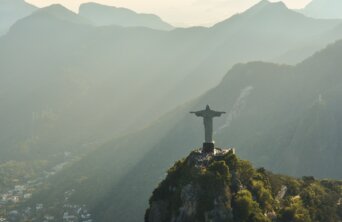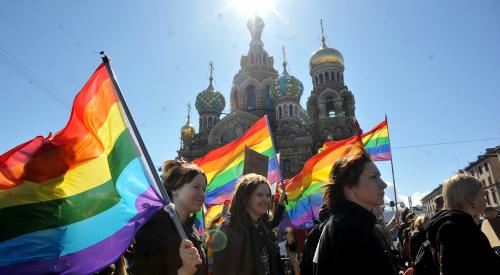- About
- Topics
- Picks
- Audio
- Story
- In-Depth
- Opinion
- News
- Donate
- Signup for our newsletterOur Editors' Best Picks.Send
Read, Debate: Engage.
| topic: | LGBT Rights |
|---|---|
| located: | Brazil |
| editor: | Ellen Nemitz |
For refugees, fleeing home is dangerous and challenging. Leaving a history, family, friends and a culture behind usually drives people to an uncertain stage of starting life over in an unknown place, often facing xenophobia and the harshness of achieving the minimum dignity abroad. When refugees also identify themselves as LGBTQ+, the situation can be even more dangerous.
This month, two important dates celebrated close to each other - World Refugee Day (20 June) and Pride Day (28 June) - reminds us how important it is to look at intersectionalities: two or more vulnerabilities that, together, make a certain situation more difficult to handle.
Despite internal violences that need to be addressed, especially when it comes to historical minorities such as LGBTQ+ individuals and black people, for instance, Brazil traditionally welcomes people of all places, genders and sexual orientations - a story published in 2018 by the local outlet Folha de São de Paulo showed that gay men coming from Africa was the most common profile of refugees in the Latin American country.
Loyal to this path, last month a pioneer program was announced during the International Day against Homophobia, Biphobia and Transphobia (17 May). The Ministry of Justice and Public Security approved, through the National Committee for Refugees (Conare), the adoption of a simplified procedure for the analysis of refugee requests from LGBTQ+ people coming from countries that apply the death penalty or prison sentences for them.
The decision, which has been considered a very important and historical step towards equality and the defence of life of all people, mostly of those threatened by gender-based prejudice, was brought to the public right before another setback in the global rights for LGBTQ+ people: Uganda, in Africa, enacted a law to harshly penalise same-sex relations with penalties that range from prison time to death.
As previously reported by FairPlanet, "62 countries continue to criminalise homosexuality in their legal codes, several of which also outlaw forms of gender expression," including five in Latin America - all in the Caribbean region: Dominica, Grenada, Jamaica, Saint Lucia and Saint Vincent and the Grenadines.
In addition, a group of nations persecutes people living same-sex relations, even though homosexuality is not officially criminalised, such as Russia, India and Indonesia. "We need to welcome those at risk and build better policies for the LGBT population in Brazil as a whole," said the president of Conare, Sheila de Carvalho.
Read more about which countries persecute LGBTQ+ people
The United Nations Agency for Refugees (UNHCR) congratulated Conare for the decision to "make more efficient the process of recognition of refugee status for LGBTQ+ people who seek international protection in Brazil due to serious persecution and discrimination in their countries of origin."
The representative of UNHCR in Brazil, Davide Torzilli, added in a note that this was an achievement for all of society since "Brazil's protection of LGBTQ+ refugee persons is a reflection of a responsible and exemplary stance towards ensuring the human rights of these people, including the right to simply be who they are."
Image by Raphael Nogueira

